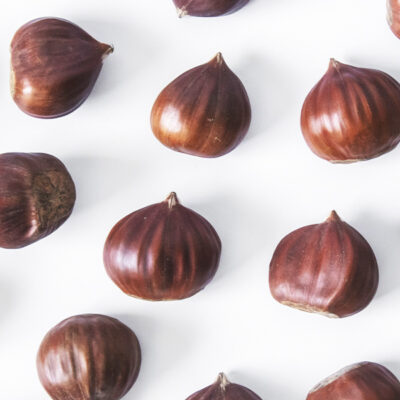Dogs can eat cooked chestnuts in small amounts if prepared properly. Boiled or roasted chestnuts must be served unseasoned. Dogs can’t eat raw chestnuts have significant levels of tannic acid, which can harm a dog’s liver and kidneys. Raw chestnuts are difficult to digest and chew, and may also pose a choking risk.

Caution: This food is generally considered risky by the veterinary community. Dogs should not eat this food and should be monitored for adverse effects.
| Food Safety | Safe when cooked, but only a small portion is healthy. |
| Nutrition | Rich in amino acids, plant protein, and omega-3 fatty acids. |
| Potential Risk | Liver or kidney damage and choking hazards. |
| Poisoning Symptoms | Vomit, diarrhea, coma, or sudden death. |
Benefits of Cooked Chestnuts
Keeping in mind raw chestnuts are a no-no for dogs, some of the nutrients in chestnuts can be beneficial for dogs and are safe if the chestnuts are cooked.
- Carbohydrates can trigger gastrointestinal issues like constipation and diarrhea.
- Omega-3 fatty acids prevent heart and brain diseases.
- Sodium may cause diarrhea or vomiting.
- Fiber helps easy digestion.
How To Prepare Chestnuts for Dogs
You could boil the chestnuts, but roasting is the preferred method. Pre-heat the oven to 425 °F (218 °C). The second step can’t be skipped (unless you want your chestnuts to potentially explode), use a scoring knife to make an X into the rounded side of each chestnut. On a cookie tray, bake the chestnuts for 20-30 minutes. Extra large chestnuts may take longer to make tender. When done, let them cool for 5 minutes. Finally, remove the peels and your dog treat is ready.
Symptoms If Your Dog Ate Too Many Chestnuts
Cooked chestnuts could be a snack if you really want them to be but if your dog is experiencing any of these symptoms, they may have eaten too many and it’d be best to speak with your vet.
- Depressed
- Diarrhea
- Vomiting
- Loss of appetite
- Tremors
Frequently Asked Questions
-
Sweet chestnuts, also known as American chestnuts, are the traditional chestnut discussed above. They need to be cooked before dogs can eat.
-
Horse chestnuts, also known as conkers, are toxic to dogs due to a neurotoxin called aesculin that, in a high amount, could damage the central nervous system. Call your vet immediately if your dog has eaten any.
-
yes, but only with the burs removed and like American chestnuts, they should be boiled or roasted.


